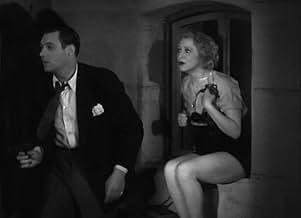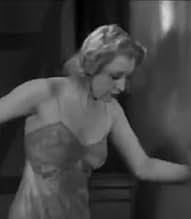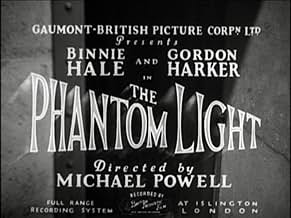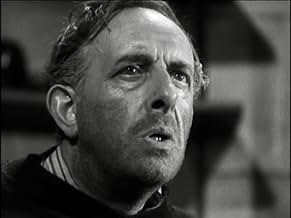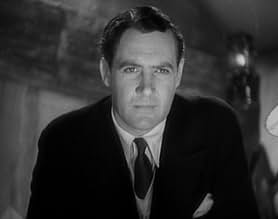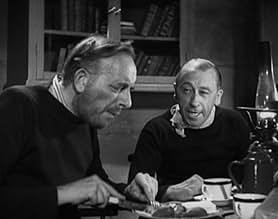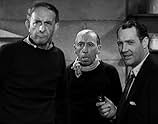Agrega una trama en tu idiomaA lighthouse keeper has been murdered in mysterious circumstances and, during the ensuing investigation a Phantom Light keeps appearing at the scene of his death.A lighthouse keeper has been murdered in mysterious circumstances and, during the ensuing investigation a Phantom Light keeps appearing at the scene of his death.A lighthouse keeper has been murdered in mysterious circumstances and, during the ensuing investigation a Phantom Light keeps appearing at the scene of his death.
- Dirección
- Guionistas
- Elenco
Anthony Holles
- Mr. Mason
- (sin créditos)
Ernest Jay
- Railway Worker
- (sin créditos)
Vi Kaley
- Woman in Pub
- (sin créditos)
John Singer
- Cabin Boy
- (sin créditos)
Opiniones destacadas
The Phantom Light is directed by Michael Powell and adapted from the Joan Roy Byford and Evadne Price play The Haunted Light. It stars Gordon Harker, Binnie Hale, Donald Calthrop, Milton Rosmer, Ian Hunter and Herbert Lomas. Cinematography is by Roy Kellino and music by Louis Levy.
Harker stars as lighthouse keeper Sam Higgins, who gets more than he bargained for when he takes up employment at the North Stack Lighthouse out on the foggy Welsh coast.
Some time before he formed half of the classic film making partnership with Emeric Pressburger, Michael Powell was a 1930s purveyor of the "quota-quickie" British movie. Not many of those films remain in print, thankfully this delightful blend of comedy and suspense is now in home format circulation. Out of Gainsborough Pictures, The Phantom Light harks back to a wonderful time of sincerity in film making, the acting mannerisms are as correct as the dialect (it's so nice to hear the term Michaelmas used), the locale is beautifully realised and maximum dramatic impact is garnered from the minimalist settings (three parts of the film is set in the lighthouse itself). Powell proves to be adept at eking out eerie atmospherics from the story, aided superbly by Roy Kellino's photography, while it's no small triumph to actually blend the comedy with the drama and not hurt the flow of the film.
Tan-y-Bwlch and lummee, what a night!
It's not perfect by any stretch of the imagination, Hale is annoyingly high pitched and shoe-horned into the fray, though her beautiful legs go up to her armpits and distract the red blooded amongst us, and the actual turn into the suspense realm comes, considering the running time, a bit too late in the story. But the faults are actually minor ones and they don't ultimately affect the enjoyment on offer for the classic film fan. It very much can be seen as a precursor and influence to the great Will Hay pictures, Ask A Policeman & Oh! Mr. Porter, and if you want links away from the thematics and plotting? Which are joyously similar, then Herbert Lomas was in Ask A Policeman and Louis Levy scored both. It doesn't have the slapstick that dominated the Hay movies, here the wit is dry and neatly pitched as polar opposites are thrust together under one lighted roof, but this is more a light hearted thriller than a comedy drama. With excellent locations used (Devon/Wales), and a director taking his early tentative steps to greatness (yes you read right), it's a film that has enough reasons to check it out regardless of story. As it is, it's pretty darn good anyway. And I'll be back to say the same thing after my next viewing at Michaelmas. 7.5/10
Harker stars as lighthouse keeper Sam Higgins, who gets more than he bargained for when he takes up employment at the North Stack Lighthouse out on the foggy Welsh coast.
Some time before he formed half of the classic film making partnership with Emeric Pressburger, Michael Powell was a 1930s purveyor of the "quota-quickie" British movie. Not many of those films remain in print, thankfully this delightful blend of comedy and suspense is now in home format circulation. Out of Gainsborough Pictures, The Phantom Light harks back to a wonderful time of sincerity in film making, the acting mannerisms are as correct as the dialect (it's so nice to hear the term Michaelmas used), the locale is beautifully realised and maximum dramatic impact is garnered from the minimalist settings (three parts of the film is set in the lighthouse itself). Powell proves to be adept at eking out eerie atmospherics from the story, aided superbly by Roy Kellino's photography, while it's no small triumph to actually blend the comedy with the drama and not hurt the flow of the film.
Tan-y-Bwlch and lummee, what a night!
It's not perfect by any stretch of the imagination, Hale is annoyingly high pitched and shoe-horned into the fray, though her beautiful legs go up to her armpits and distract the red blooded amongst us, and the actual turn into the suspense realm comes, considering the running time, a bit too late in the story. But the faults are actually minor ones and they don't ultimately affect the enjoyment on offer for the classic film fan. It very much can be seen as a precursor and influence to the great Will Hay pictures, Ask A Policeman & Oh! Mr. Porter, and if you want links away from the thematics and plotting? Which are joyously similar, then Herbert Lomas was in Ask A Policeman and Louis Levy scored both. It doesn't have the slapstick that dominated the Hay movies, here the wit is dry and neatly pitched as polar opposites are thrust together under one lighted roof, but this is more a light hearted thriller than a comedy drama. With excellent locations used (Devon/Wales), and a director taking his early tentative steps to greatness (yes you read right), it's a film that has enough reasons to check it out regardless of story. As it is, it's pretty darn good anyway. And I'll be back to say the same thing after my next viewing at Michaelmas. 7.5/10
Gordon Harker arrives at the tiny Welsh village where everyone seems to be named Owen. He's to take over the light house in the bay. He listens to stories about the Ghost Light that led the two earlier masters to their death: the light goes out, another one appears, and guides a ship onto the rocks. "Wreckers" he says, and thinks no more of it. He also doesn't think much of Ian Hunter, who claims to be a reporter and offers him lots of money to go to the lighthouse, nor of Binnie Hale, who also makes the same request. He's proud of his 25 years in the service, and runs things by the book. When he gets to the house, there's a helper who's being tended to by doctor Milton Rosmer. Most of the time he's out, but occasionally he gets up and tries to kill someone with his bare hands.
It's a nicely opened version of the stage play by Evadne Price and Joan Roy Byford., with some nice location shooting in th west counties and Wales. It makes me wonder if this was the inspiration for dirctor Michael Powell to wander the island, far from London, and look at the weird and wonderful way people live far from London.
It's a nicely opened version of the stage play by Evadne Price and Joan Roy Byford., with some nice location shooting in th west counties and Wales. It makes me wonder if this was the inspiration for dirctor Michael Powell to wander the island, far from London, and look at the weird and wonderful way people live far from London.
I didn't expect much from this obscure film and that was the right approach.
The film's pace is a big letdown - it's consistently slow from beginning to end. The scriptwriters couldn't have been bothered with the development of the story, as it is never made clear what is going on.
Gordon Harker does quite well and tries his best to enliven the proceedings but it's all in vain.
In '30's British films I've always liked the mix of pithy Music Hall humour, mild ghostliness, a frisson of sex, and manly London chaps saving the day, all displayed perfectly in the Phantom Light. Director Michael Powell's best stuff was yet to come of course, but this can be seen as him still learning his craft practising with more inconsequential trifles.
Gordon Harker here shines with some cracking comedy lines handed to him, as the new lighthouse-keeper at a rather ... insular Welsh coastal village, apparently 200 years behind the times with Wrecking ships on the rocks still big business. Ian Hunter is the manly Londoner with all the brains ... er, I think this was his last British film until after the War ended. He was the best King Richard Hollywood ever had! Until the last reel Binnie Hale has no brains but admirably compensates with long legs. Herbert Lomas perfects the character he particularly re-used later in Ask a Policeman and The Ghost Train - he was even back in Powell & Pressburger's I Know Where I'm Going! But the film that borrowed the most from this was Arthur Askey's Back Room Boy from '42, it even looked the same inside the lighthouse!
A pleasant 75 minutes spent in the company of familiar faces and story.
Gordon Harker here shines with some cracking comedy lines handed to him, as the new lighthouse-keeper at a rather ... insular Welsh coastal village, apparently 200 years behind the times with Wrecking ships on the rocks still big business. Ian Hunter is the manly Londoner with all the brains ... er, I think this was his last British film until after the War ended. He was the best King Richard Hollywood ever had! Until the last reel Binnie Hale has no brains but admirably compensates with long legs. Herbert Lomas perfects the character he particularly re-used later in Ask a Policeman and The Ghost Train - he was even back in Powell & Pressburger's I Know Where I'm Going! But the film that borrowed the most from this was Arthur Askey's Back Room Boy from '42, it even looked the same inside the lighthouse!
A pleasant 75 minutes spent in the company of familiar faces and story.
Very funny British Gainsborough Picture from 1935 with plenty of No-code 'damn' 'ruddy' and 'cor-blimey' -ies along with Binnie Hale's long legs and keen 'how about it' frankness, THE PHANTOM LIGHT is a bookend GHOST TRAIN fog bound mystery set on the shrouded eerie Welsh coast. The photography and settings particularly in the quaint railway scenes in reel one and the village scenes near the end offer the viewer genuine storybook pleasure in that they look completely fake but are not at all. It just happens to naturally all look like some plaster model. Lead actor, music hall star Gordon Harker has some hilarious lines - particularly the closing one: "Lummy! what a night" which would have rocked any Odeon theatre with gales of laughter. Binnie Hale is the Brit Joan Blondell, all perky and silly and ready to cut up her trousers all ready to gad about the lighthouse stairways in hotpants and high heels. Local Welsh eccentricness is on full display with plenty of Popeye style gnarling and eyeball flexing. I thought it was hilarious as (later famous) Director Michael Powell was clearly getting his actors to have fun with their roles. The local policeman is exactly like Constable Plod from the Noddy kids books..all tubby and bug eyed. It is all silly and very funny. The Warner bros pic SHH! THE OCTOPUS of 1935 is a good counterpart from the USA.
¿Sabías que…?
- TriviaWhen Alice Bright (Binnie Hale) remarks that she had just been performing in a play, Sam Higgins (Gordon Harker) retorts, "East Lynne?" This is a reference to the oft produced play and movie of Mrs. Henry Wood's novel of the same name. "East Lynne" was enjoyed for its mad plot and frequently incomprehensible dialogue.
- ErroresSam Higgins arrives at Tan y Bwlch to take a boat to the North Stack lighthouse offshore. Both places exist but are about 60 miles apart. Tan y Bwlch is on the shore of a reservoir, not the sea, and North Stack lighthouse, on the isle of Anglesey, is onshore, not off.
- Citas
Alice Bright: Mr Higgins. I'm going to tell you the truth. I'm an actress, hiding from the police.
Sam Higgins: What, you act as bad as all that?
- ConexionesFeatured in Hecho en Inglaterra: Las películas de Powell y Pressburger (2024)
Selecciones populares
Inicia sesión para calificar y agrega a la lista de videos para obtener recomendaciones personalizadas
Detalles
- Tiempo de ejecución1 hora 16 minutos
- Color
- Relación de aspecto
- 1.37 : 1
Contribuir a esta página
Sugiere una edición o agrega el contenido que falta

